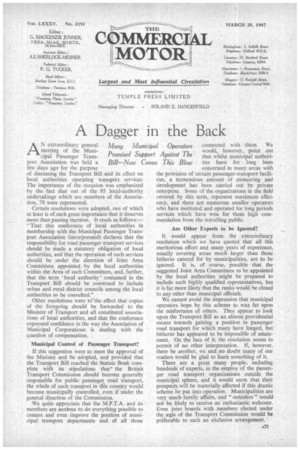A Dagger in the Back
Page 25

If you've noticed an error in this article please click here to report it so we can fix it.
AN extraordinary general meeting of the Municipal Passenger Transport Association was held a few days ago for the purpose of discussing the Transport Bill and its effect on local authorities operating transport services. The importance of the occasion was emphasized by the fact that out of the 95 local-authority undertakings which are members of the Association, 78 were represented.
Certain resolutions were adopted, one of which at least is of such great importance that it deserves more than passing mention. It reads as follows:— " That this conference of local authorities in membership with the Municipal Passenger Transport Association (incorporated) declares that the responsibility for road passenger transport services should be made a statutory obligation of local authorities, and that the operation of such services should be under the direction of Joint Area Committees appointed by the local authorities within the Area of such Committees, and, further, that the term 'local authority' contained in the Transport Bill should be construed to include urban and rural district councils among the local authorities to be consulted."
Other resolutions were to thefl effect that copies of the foregoing should be forwarded to the Minister of Transport and all constituted associations of local authorities, and that the conference expressed confidence in the way the Association of Municipal Corporations is dealing with the question of compensation.
Municipal Control of Passenger Transport?
If this suggestion were to meet the approval of the Minister and be adopted, and provided that the Transport Bill reached the Statute Book complete with its stipulations that the British Transport Commission should become generally responsible for public passenger road transport, the whole of such transport in this country would become municipally controlled, even if under the general direction of the Commission.
We quite appreciate that the M.P.T.A. and its members are anxious to do everything possible to cement and even iinprove the position of municipal transport departments and of all those connected with them. We would, however, point out that whilst municipal authorities have for long• been concerned in many areas with the provision of certain passenger-transportfacilities, a tremendous amount of pioneering and development has been carried out by private enterprise. Some of the organizations in the field covered by this term, represent maximum efficiency, and there are numerous smaller operators who have instituted and operated for long periods services which have won for them high commendation from the travelling public.
Are Other Experts to be Ignored?
It would appear from the extraordinary resolution which we have quoted that all this meritorious effort and many years of experience, usually covering areas much larger than those hitherto catered for by municipalities, are to be ignored. It is, of course, possible that the suggested Joint Area Committees to be appointed by the local authorities might be prepared to include such highly qualified representatives, but it is far more likely that the ranks would be closed to any other than municipal officials.
We cannot avoid the impression that municipal operators hope by this scheme to wax fat upon the misfortunes of others. They appear to look upon the Transport Bill as an almost providential means towards gaining a position in passenger road transport for which many have longed, but hitherto has appeared to be impossible of attainment. On the face of it; the resolution seems to permit of no other interpretation. If, however, there be another, we and no doubt many of our readers would be glad to learn something of it.
• There are a great many people, including hundreds of experts, in the employ of the Passenger road transport organizations outside the municipal sphere, and it would seem that their prospects will be materially affected if this drastic scheme be put into operation. Municipalities are very much family affairs, and " outsiders " would not be likely to receive an enthusiastic welcome. Even joint boards with members elected under the mgis of the Transport Commission would be preferable to such an exclusive arrangement.
















































































